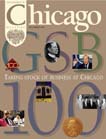The University of Chicago Magazine
December 1997

Last summer, D. Gale Johnson did a little traveling. He visited Moscow and Berlin. He taught in China for a month. He spent three and a half weeks on the Black Sea and a week in the Ukraine. He stopped off in Turkey to attend a conference, but was home in time to teach the fall-quarter honors class for fourth-year economics majors, move into a condominium, and take up his duties as president-elect of the American Economic Association.
In other words, it was an average summer for the University of Chicago agricultural economist and one-time provost-who, by the way, retired 10 years ago at the age of 71.
Gale Johnson could have rested on his laurels a long time ago if he happened to be the resting kind. He's not. The laurels, though, are undeniable. His publications are considered the ultimate word in explaining how national economic policies affect the flow of international trade. His research in developmental economics helped make him the single educator most responsible for the flourishing of China's market-oriented reform. And in the late 1970s, when economists around the world were setting off alarms about famine in the former Soviet Union and calling for massive Western aid, Johnson called it a brief episode that would soon be over. And so it was.
"Gale is probably the greatest living economist of this century who has studied the economics of agriculture," says a former student, John M. Antle, AM'79, PhD'80, now a professor of economics at Montana State University. "Whenever I come across an important policy issue related to agriculture, I find, with a few recent exceptions, that he has written about it better than anyone else, and before anyone else."
Since 1980, Johnson has visited China virtually every year, some years as often as three or four times. His interest in the country began, he says, "primarily because of my daughter, Kay Ann," who as a graduate student in Hong Kong was among the first Americans allowed into China. Not only did she meet Mao Tse Tung and Chou en Lai, she was there when it was announced that President Richard Nixon would soon be visiting China. "She heard it on a village loudspeaker," chuckles her father, "and she didn't believe it."
When post-Mao China began its shift to market-oriented reform at the end of the 1970s, Gale Johnson himself was there. In 1980, he led a group of American economists to Beijing, where they delivered the country's first course in modern economics. Recalls former student Justin Yifu Lin, PhD'86, now a professor at Peking University and director of its China Center for Economic Research: "This was the first time that modern economics was systematically introduced in China after 30 years' interruption. Since then, about 20 economists with Ph.D. training from foreign universities have returned to China. The China Center for Economic Research has 13 of the 20. Among those 13, four were Professor Johnson's students at Chicago. It is no exaggeration to say that he is the father of modern economic research in China." By the time the U of C's current crop of Ph.D. candidates finish their degrees, says Johnson, China will have 14 or 15 Chicago-trained agricultural economists.
China's achievement in feeding its vast population-a challenge Mao's regime never solved-has been a startling turnaround in less than two decades, Johnson observes. "The move toward a market economy has been very, very successful there, in the countryside more than in the cities." And to the extent that things are improving in the cities, he adds, it's the countryside that must be thanked. "The moving in and distribution of food largely by people who come from the countryside is driving the state stores out in almost all foods except grain. The state store system was so inefficient, so insensitive to people's needs, that the private sector has pretty much taken over food distribution."
Johnson has little doubt that China is on its way to being the dominant economic power in Asia, "partly due to India's failure to grow very rapidly in the last 20 years. In terms of economy, India has far more problems than China; there are just too many people in India who are too damned comfortable."
Could China end up splintering the way the Soviet Union did? "Yes," he concedes, "but I don't know how likely that is. The southeast is a matter of considerable concern to Beijing now. Beijing itself is much weaker than it was 20 years ago; it collects only half as much relative to gross national product. Making Hong Kong part of China may have increased these problems. There are real tensions in the country."
As for U.S.China tensions, Johnson thinks this country takes an unbalanced approach to civil rights issues. "We say we're interested in rights," he explains, "but we're by and large interested in the rights of dissidents. There's been no criticism at the political level here of China's population policy, although the pressure put on women there to have abortions is a far greater violation of civil rights than anything that's done politically. It just hasn't reached the consciousness of American politicians or civil rights activists.
"And the greatest improvement in civil rights the world has ever seen," he adds, "occurred in China when the communes were abolished. Virtually every day, people living in the communes had no civil rights; the commune controlled the economy, their lives as workers, the political and police powers. That all disappeared overnight, and 700 million people were released from domination by a bunch of bureaucrats. On balance, I would say the civil rights record of China is very good in the past 20 years, though you can't tell that by listening to the press in the United States."
Johnson thinks the Chinese have a right to be irritated. "It's true their dissidents don't get a fair shake, but many people would argue a lot of blacks in this country don't get a fair shake from our police. No country's civil rights record is perfect. It's mainly a matter of what you see in changes over time, and I think the change in China has been enormous."
